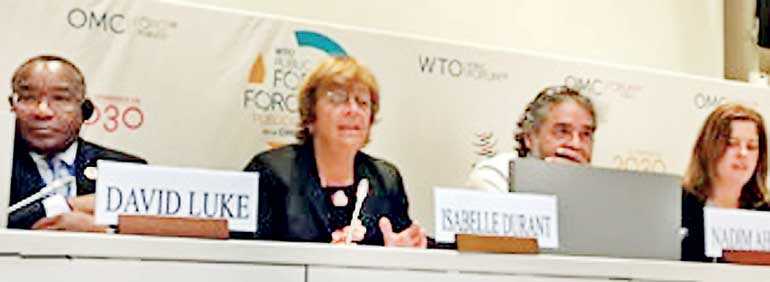Sunday Mar 01, 2026
Sunday Mar 01, 2026
Thursday, 1 November 2018 00:48 - - {{hitsCtrl.values.hits}}

The idea that governments around the world must support women as traders, workers and entrepreneurs to drive international commerce has been recognised in several multilateral agendas in recent years, but experts say that a data gap needs to be filled before the most effective policies can be designed.
The issues were discussed at a session of the World Trade Organisation’s Public Forum in Geneva in October, organised by UNCTAD, which brought together leading statisticians and policymakers.
“We know that the impacts of trade policies are not evenly distributed by gender,” the head of UNCTAD’s statistical branch Steve MacFeely said.
“While several agendas – such as the 2030 Agenda for Sustainable Development and the Addis Ababa Action Agenda on aligning financing flows with economic, social and environmental priorities – signal an international commitment to female empowerment in trade, lack of data and statistical capacity gaps prevent accurate monitoring of the nexus between gender and trade,” he said.
Disentangling the multi-dimensions of trade policy on gender is notoriously tricky, posing several statistical challenges for defining the variables and linking them together.
“Lack of information makes policies less effective or even ill-targeted which may exacerbate gender disparities,” MacFeely said.
Trade-gender nexus
The first fruit of this work is a policy brief on developing a statistical framework for the analysis of gender and trade that can support governments to review data gaps and fill them.
“This will be one of many steps in a wider capacity-building program to strengthen the ability of countries to measure the trade-gender nexus so that they can design more inclusive trade policies in the future,” MacFeely said.
Panellists at the WTO event, chaired by UNCTAD Deputy Secretary-General Isabelle Durant, asked which data were necessary for formulating gender-responsive trade policies, and how to improve their availability.
Marie-France Paquet, chief economist at Global Affairs Canada, said that her country had made some headway by gathering all gender-related statistics in a single online repository.
“In developed economies, opportunities exist to creatively link together various data sources to capitalise on existing information,” MacFeely explained.
Canada’s experience, for example, revealed how employer data could provide accurate breakdowns of gender composition in economic sectors to give industry-level impact assessments of trade policies, Paquet said.
By contrast, structurally different African economies, for example, face a different set of challenges complicated by off-the-books economic activity and cross-border financial flows.
Complex challenges
Analysis of global value chains – the complex international supply and manufacturing chains along which modern goods pass – can show the important part played by women in global trade but which is missed by trade statistics alone.
“A way to solve this would be to establish a link between exporting firms and their employees to enable better analysis of gender roles across the whole value chain over time,” Nadim Ahmad, chief of the Trade and Competitiveness Statistics Division at the Organisation for Economic Co-operation and Development, said. “In the absence of this, collaboration with the private sector presents opportunities for filling data gaps.”
Ahmad said the OECD and the World Bank Group had recently collaborated with Facebook to survey several firms each month, to find out what was stopping women business owners from trading internationally and integrating into global value chains. Barriers included restricted access to finance and inequality in information networks.
While the need for better data is clear, the challenges are complex, the gender concerns vary depending on the country, and the different statistical capacities of advanced and developing economies need to be taken into account.
Also taking part in the discussion were Alison Holder, director of Equal Measures 2020, Amelie Kvarnström, trade adviser at the National Board of Trade, Sweden, and David Luke, head of the African Trade Policy Centre of the United Nations Economic Commission for Africa.
“The 2030 Agenda for Sustainable Development emphasises the importance of equality and human rights, with the primary goal of ‘leave no-one behind’,” Durant said. “International trade has been criticised for leaving out a large part of the population. And among the ‘forgotten’, many are women.”